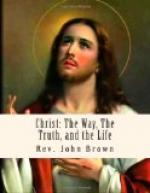seasonable, yea, and acceptable unto them. If
he, who is the Truth, would give grace to understand,
and to unfold this so necessary and always advantageous
a truth, and would help to write of and explain this
truth by faith in him who is here said to be the Truth,
then should we have cause to bless and magnify his
name. But if he, because of sin, shall hide himself,
and not let out these beams of light, whereby we might
discover light, we shall but darken counsel with words
without our knowledge, and leave the matter as unclear
as ever. Therefore is it necessary, there be both
in him that writeth, and in such as read, a single
dependence on him, who “is for a leader,”
Isa. lv. 5, and hath promised to “bring the blind
by a way which they know not, and to lead them in
paths they had not known, and to make darkness light
before them, and crooked things straight,” Isa.
xlii. 16, that thus by acting faith on him we may find,
in so far, the truth of this verified,
viz. that
he is the Way, the Truth, and the Life. Now,
for clearing up of this matter, we would know, that
our Lord Jesus, from the beginning of this chapter,
is laying down some grounds of consolation, sufficient
to comfort his disciples against the sad news of his
departure and death; and to encourage them against
the fears they had of much evil to befall them when
their Lord and Master should be taken from them; which
is a sufficient proof of the tender heart of Jesus,
who alloweth all his followers strong consolation against
all fears, hazards, troubles, and perplexities which
they can meet with in their way. He will not
leave them comfortless, and therefore he layeth down
strong grounds of consolation to support their drooping
and fainting hearts; as loving to see his followers
always rejoicing in the Lord, and singing in the ways
of Zion: that the world may see and be convinced
of a reality in Christianity, and of the preferableness
of that life, notwithstanding of all the troubles
that attend it, unto any other, how sweet and desirable
soever it may appear to flesh and blood.
In prosecution of which design, he told them, verse
4, that they “knew whether he went,” and
the way also which he was to take, and by which he
was to bring them to the Father, to the mansion spoken
of, and so to life eternal. But Thomas rashly
and incredulously (as too usually he did, chap. xi.
16; xx. 25,) venteth himself, and little less than
contradicteth his Master, saying, verse 5, “We
know not whither thou goest, and how can we know the
way?” wherein we have an emblem of many a believer,
who may have more grace and knowledge of God and of
Christ than they will be able to see, or acknowledge
that they have; what through temptations, inward distempers,
sense of their many defects, and great ignorance,
strong desires of high measures, clearer discoveries
of the vastness of the object, mistakes about the
true nature of grace, despising the day of small things,
and indistinctness as to the actings of grace, or
want of understanding and right uptaking of grace in
its various outgoings and actings under various notions,
and the like.




